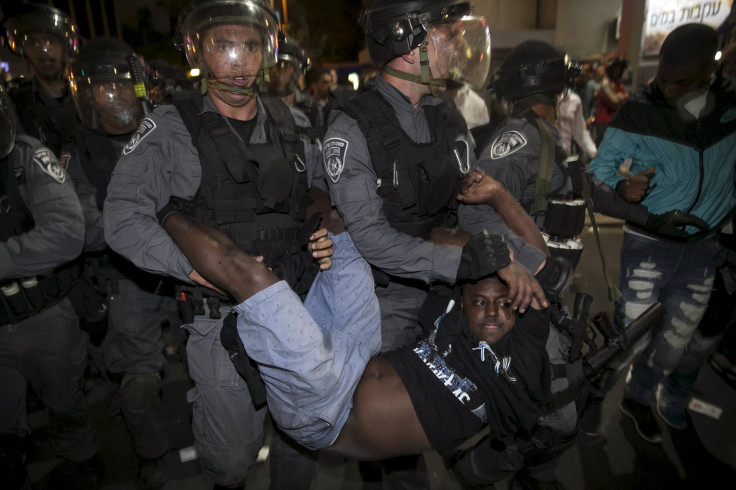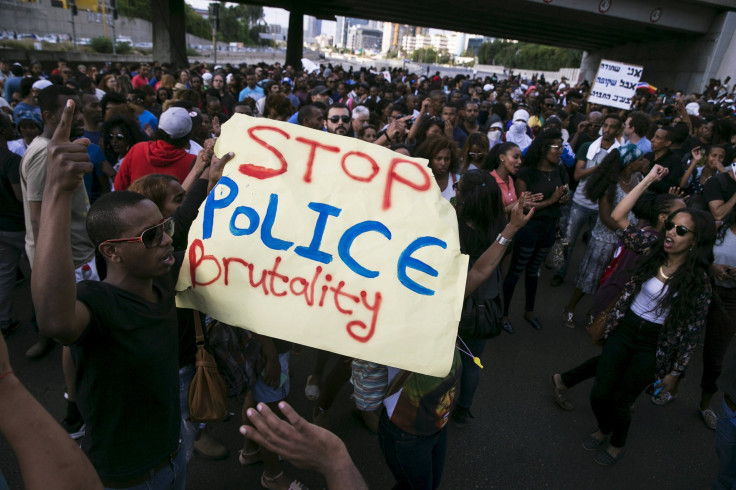Police, Demonstrators Clash In Tel Aviv During Anti-Racism Protest Sparked By Soldier's Beating

Update as of 5:29am EDT: Israel's President Reuven Rivlin admitted that his country had made "mistakes" in its treatment of the Ethiopian Jewish community, after thousands of Ethiopian Israelis protested over widespread racism and police brutality.
"We have made mistakes. We did not look, we did not listen enough," he said, according to Agence France-Presse.
UPDATE 5:50 p.m. EDT: Clashes between police and anti-racism demonstrators in Tel Aviv Sunday left 46 people injured, including 23 police officers. Ynetnews.com reported the demonstrators closed Ayalon Highway for three hours before moving their protest to Rabin Square where the rally devolved into violent clashes with police who used stun grenades and pepper spray to disperse the rock-throwing crowd.
Twenty-six were reported arrested.
Members of the Ethiopian community accuse police of brutality and Israel of racism following the beating of an Israeli army soldier of Ethiopian descent.
The Jerusalem Post said demonstrators numbered in the thousands. Riot police moved in after Public Security Minister Yitzhak Aharonovich appeared in Rabin Square and the crowd surged forward. Mounted officers charged amid a hail of rocks, bottles and other projectiles. Several police cars and motorcycles were damaged.
“We’re here because this cop has to be put in jail. We’re tired of being abandoned and we don’t want to see one more soldier hurt like this,” Zehava Avera of Netanya told the Post.
A young Ethiopian man who declined to give his name to the Post said the protests may have been inspired by the recent racial unrest in the United States. "Israel copies everything from the U.S. They’ve copied the way the US treats black people,” the man said.

UPDATE 2:45 p.m. EDT: Twenty police officers were reported injured in a demonstration over racism against the Ethiopian community in Israel Sunday, Israel News Feed reported.
BREAKING PHOTO: Overturned Police car during mass Ethiopian Israeli protest in Tel Aviv, 8 Police officers injured. pic.twitter.com/oLqSoz2zwl
- Israel News Feed (@IsraelHatzolah) May 3, 2015
PHOTO: Shattered police car as Ethiopian Israeli protest in Tel Aviv turns violent, at least 20 injured. pic.twitter.com/9K4tyjvk6t
- Israel News Feed (@IsraelHatzolah) May 3, 2015
Original post:
Demonstrators clashed with police in Rabin Square in Tel Aviv Sunday, in a protest against police treatment of members of the Ethiopian community in Israel following last week's beating of an Israeli soldier. Hundreds of demonstrators blocked a busy Tel Aviv highway before heading to the square, where protesters threw stones at police, who responded with pepper spray, Haaretz reported. The newspaper said the demonstrators tried to break into City Hall.
Prime Minister Benjamin Netanyahu said he would meet with representatives of the Ethiopian community Monday to discuss the incident, and with the soldier who was beaten, the prime minister's office said. Police and other government officials also were to attend.
The Jerusalem Post reported protesters blocked Ayalon highway about 6 p.m. The demonstration lasted about an hour before protesters headed for Rabin Square. The protesters, who also closed down other major arteries, chanted, "Not black, not white, we're all human beings," Ynetnews.com reported. The march followed a demonstration in Jerusalem that was dispersed by police using tear gas. Ten protesters required medical treatment.
Demonstration stopping highway traffic in Tel Aviv pic.twitter.com/OXFh5S93mV
- Bruce Dov Krulwich (@krulwich) May 3, 2015
The U.S. Embassy in Tel Aviv issued a warning about the demonstration, advising U.S. citizens to avoid the area of the march.
Members of the Ethiopian community told Ynetnews things must change. Safinau Malako, a resident of the Mevaseret Zion absorption center, said this round of protests must lead to a solution.
"We've had struggles that ended without results, and this time we have to continue and not stop until the society and politicians wake up," he said. "This situation cannot continue. We're Israelis just like everyone else. A large portion of Israeli Ethiopians were born here, and they deserve their rights."
Police Chief Yohanan Danino has appointed a committee to look into reports of police brutality and urged members to work quickly.
The protests were sparked by a video of a police officer beating Damas Pakada, a member of the Israeli army. The video shows Pakada standing with his bicycle and being accosted by the officer. The two talk, and then the police officer starts hitting and shoving Pakada before being joined by two other officers.
Pakada winds up on the ground with the officers beating and kicking him, then arresting him.
"I arrived at the scene five minutes after the incident," Pakada's brother told Ynetnews. "The video was given to us by neighbors who filmed it on a home video camera. My brother was recruited recently, he is a good boy and an outstanding student. He is someone who never hit anyone. They are just animals, not people. I have still not been able to talk to him."
Israeli police condemned the attack.
© Copyright IBTimes 2025. All rights reserved.






















